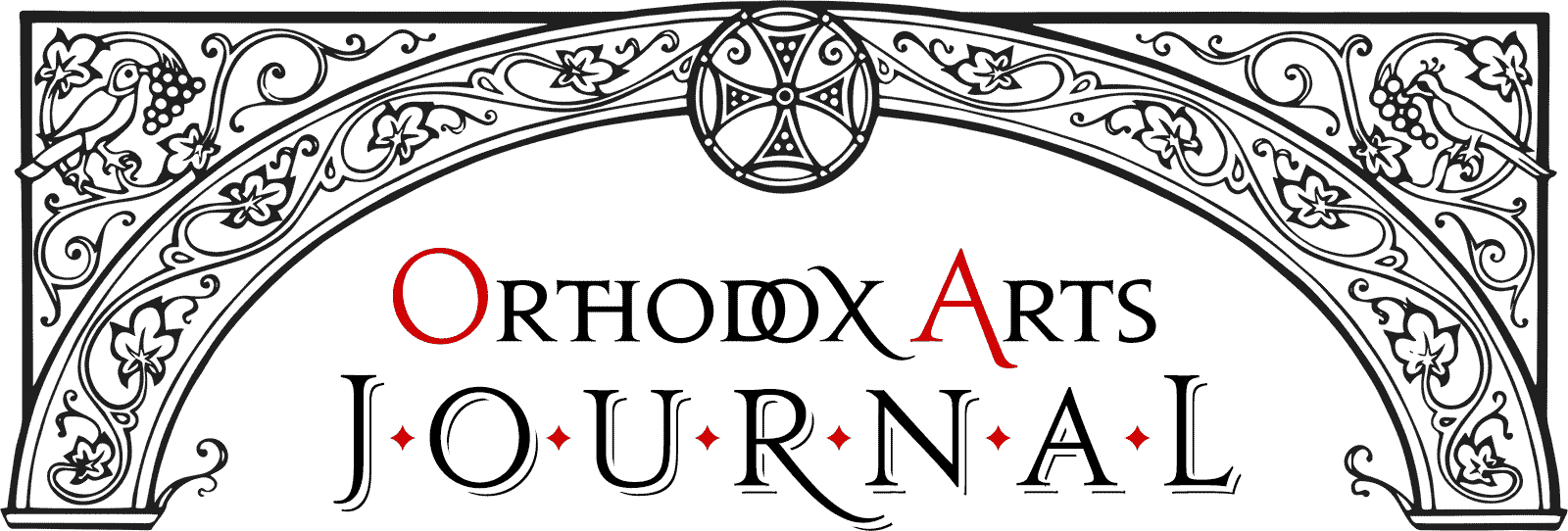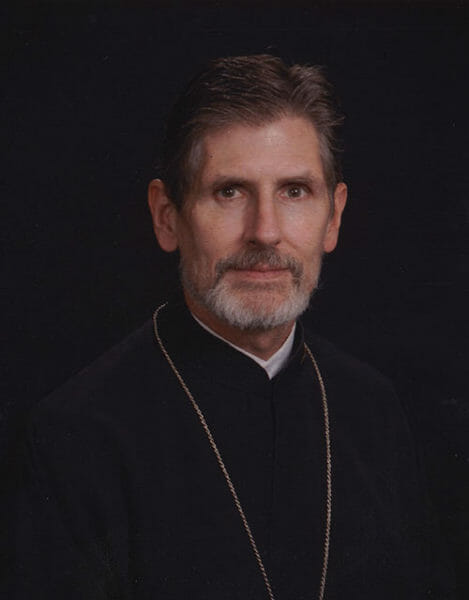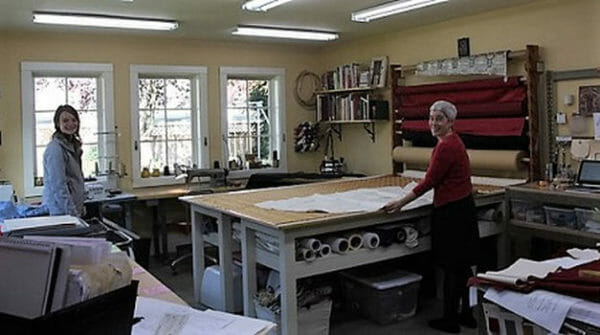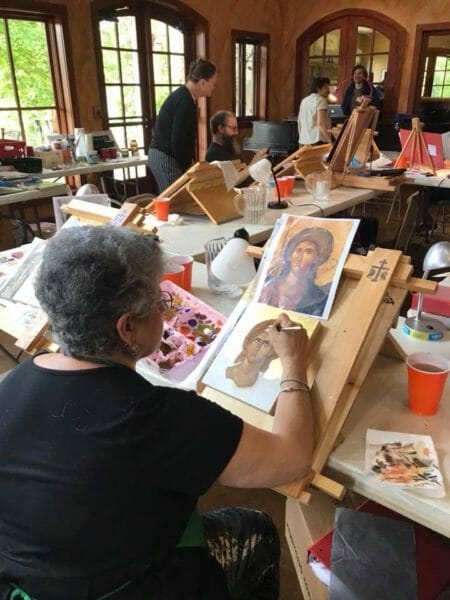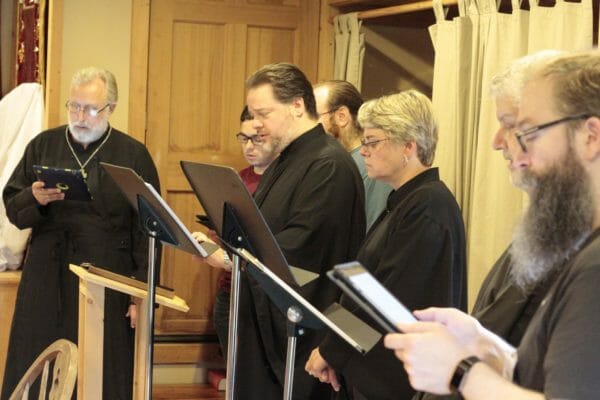Similar Posts
English-speaking Orthodox faithful in the United States who have wanted to learn the liturgical arts of the Orthodox Church — music, iconography, vestments, architecture and furnishings design, etc. — have historically had limited opportunities to study with knowledgeable teachers. Some have had the opportunity to go overseas to countries such as Greece and Russia to study, but this approach poses many barriers — cost, time, and language, just to begin with. Self-study has been a solution for others, but the quality of available reference materials in English has been unreliable, and the dangers with this approach have included incomplete grounding in fundamentals and lack of live feedback.
In recent years, however, many American Orthodox Christians who have had the opportunity to study the liturgical arts have embraced the responsibility to pass on what they have learned. Not only that, but some church leaders have recognized the need for establishing organized educational initiatives so that such teachers may teach, and those who want to learn can do so without needing to fly across the ocean.
Fr. Anthony Salzman, pastor of St. Philothea Greek Orthodox Church in Watkinsville, GA and Director of The Liturgical Arts Academy, is himself an iconographer who had the chance to study in Greece, as well as a churchman who saw a training gap that needed to be filled. He and cantor Constantine Kokenes of Annunciation Greek Orthodox Cathedral in Atlanta shared a vision of developing a program to pass these traditions on to the next generation, and together, they came up with the plan.
“The Liturgical Arts Academy to train men and women in the traditional Orthodox arts of chanting and iconography,” is how Fr. Salzman describes it. With the blessing and encouragement of his bishop, Metropolitan Alexios of the Greek Orthodox Metropolis of Atlanta, as well as grant support from the Calvin Institute, the Academy held its inaugural weeklong session in May 2018 against the backdrop of the Metropolis’ Diakonia Retreat Center in Salem, South Carolina. His Eminence Alexios celebrated the opening Divine Liturgy, and 30 students were in attendance from all over the United States for the opportunity to learn iconography from Fr. Salzman and Byzantine chant from teachers like John Michael Boyer, protopsaltis of the Greek Orthodox Metropolis of San Francisco, and Constantine Kokenes.
Response to the initial sessions was overwhelmingly positive. Jamie Tarasidis, a cantor from Greenwood, SC, says of her own experience, “I learned a lot from the teachers and the curriculum, but I also learned a lot from the other people who were here.” Iconography student, Jennifer Horton of Athens, GA also says, “I was particularly impressed with the organization and the depth of knowledge of Fr. Salzman. His knowledge of iconography is extensive, and the way he shares it with another makes it part of your story also.”
The Academy’s success in 2018 made it an easy decision to organize a second session. It will take place August 18-24, 2019, once again at the Diakonia Retreat Center, and grant support from Leadership 100 will partially subsidize each student’s tuition, reducing the cost of each enrollment by $300. Fr. Anthony will teach the iconography workshop and John Michael Boyer will return for the 2019 session, instructing an advance level chant class. The Byzantine chant faculty is adding two new instructors with Gabriel Cremeens and Samuel Herron, protopsaltes of St. George Greek Orthodox Church in Albuquerque, NM, and Assumption Greek Orthodox Church in Scottsdale, AZ, respectively. In addition, the Academy is offering a Liturgical Textiles track, taught by noted ecclesiastical tailor Kh. Krista West of Salem, OR. Word of mouth from last year’s attendees, many of whom are returning this year, appears to have had a positive impact; as of this writing, 43 students are enrolled — 27 for Chanting, eight for Iconography, and eight for Liturgical Textiles.
The Academy’s schedule will follow the model established last year: Students and faculty will gather on Sunday, and the proceedings will kick off in the evening with Vespers, dinner, and introductory lecture. The daily routine will be grounded in worship, with daily Orthros and Vespers sung by the chant instructors and their students. There will be six hours of instruction per day, plus meals, and then lectures in the evenings from the faculty on aspects of iconography, liturgics, church history and music.
Iconography students will learn the process of painting an icon, beginning with fundamentals of drawing, form development, color theory, gilding, and brushwork. The course will accommodate everyone from the absolute beginner to a more experienced painter, and Fr. Salzman will work individually with each student. Beginners may paint with acrylics and more experienced students may use egg tempera. By the end of the week, every student will have completed and varnished a beautiful icon.
The Chanting classes will be divided into beginning, intermediate, and advanced courses, with learning objectives including Byzantine notation, music theory, expression and style, and repertoire. Beginning students will master the basic diatonic scale and the signs of Byzantine notation, and learn simple hymns. Intermediate students, picking up where last year’s beginning class left off, will learn different scales, modulations, more advanced notational concepts, complex hymns, and principles of ornamentation. Advanced students will refine their style and ornamentation, learn more sophisticated repertoire, and become more familiar with modal theory.
Kh. Krista West’s Liturgical Textiles track will teach students with intermediate-and-higher sewing skills already to cut and sew a lined and finished brocade proskynetarion, as well as an embroidered cloth cover. Kh. Krista will work students on techniques such as counted thread cross stitch and drawn thread hem finishing.
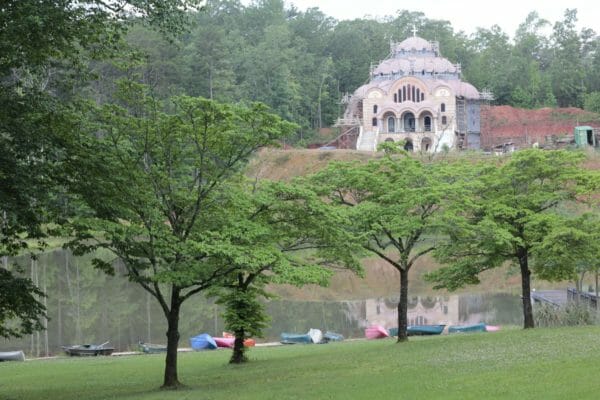 Registration is still open for the 2019 session but there is limited space. Registration for the 2020 TLAA session (May 24- 30, 2020) will open in September. More information may be found at the Academy’s website, and questions may be directed to info@theliturgicalarts.org.
Registration is still open for the 2019 session but there is limited space. Registration for the 2020 TLAA session (May 24- 30, 2020) will open in September. More information may be found at the Academy’s website, and questions may be directed to info@theliturgicalarts.org.
The Liturgical Arts Academy seeks to revitalize the arts of the Orthodox Church for the faithful in America and make these traditions accessible at the parish level. It is doing so by making a high level of instruction available here in the States from teachers who are well-qualified to help shape a new generation of ecclesiastical artisans. Thus, the Academy is fast becoming a major contributor to the vitality of the liturgical arts at the parish level. Consider enrolling and experiencing it for yourself!
